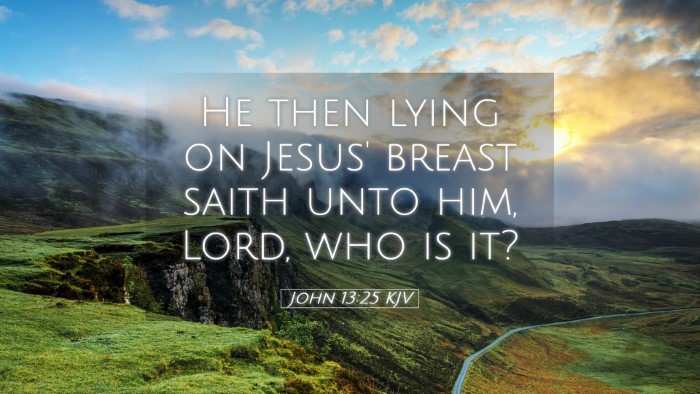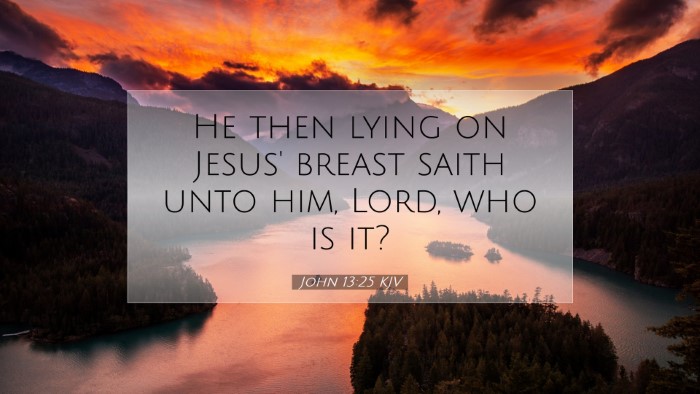Commentary on John 13:25
Verse Context: John 13:25 states, "He leaned back against Jesus' chest and asked him, 'Lord, who is it?'" This moment occurs during the Last Supper, a significant event that encapsulates themes of betrayal, loyalty, and divine revelation.
Understanding the Passage
This action of leaning on Jesus' breast is laden with profound symbolic significance. It represents both intimacy and inquiry, drawing attention to John as the disciple whom Jesus loved.
Insights from Matthew Henry
Matthew Henry emphasizes that the closeness displayed here indicates a deep personal relationship with Christ. John, the Beloved disciple, enjoys a privileged position as one who is receptive to divine truths. Henry observes:
- Intimacy with Christ: John's physical closeness to Jesus illustrates an essential spiritual principle: to know Christ, one must draw near to Him.
- Inquiry in Faith: John's question arises from a heart that desires understanding, illustrating that true discipleship involves asking difficult questions of the Master.
Insights from Albert Barnes
Albert Barnes discusses the implications of John's action. He writes about the nature of the inquiry and the role of Jesus as a source of truth:
- The Role of the Beloved Disciple: John’s position is indicative of his role as a figure of authority within the apostolic circle, allowing proximity to Jesus during critical moments.
- Betrayal Revealed: Barnes notes that this passage precedes the revelation of Judas as the betrayer, emphasizing that intimacy does not preclude betrayal; instead, it sets the stage for understanding the depths of human depravity.
Insights from Adam Clarke
Adam Clarke provides an in-depth analysis of the cultural context of the event. He notes that the act of reclining at the table was customary during meals, suggesting a setting ripe for private dialogue:
- Cultural Norms: Clarke explains that it was typical to recline during meals in the Eastern social setting, indicating that this casual position of John reflects a bond and trust with Jesus.
- Question of Identity: The inquiry “Lord, who is it?” signifies more than mere curiosity; it reflects a longing for clarity in a moment fraught with tension and impending betrayal.
Theological Implications
The depth of this verse resonates with the overarching themes of love, betrayal, and revelation found throughout the Gospel of John:
- Divine Love vs. Human Betrayal: This intimate moment foreshadows the stark contrast between Christ’s sacrificial love and Judas’ imminent betrayal.
- Revelation of Truth: The act of inquiry as a prelude to revelation suggests that spiritual understanding often requires a humble posture of leaning into Christ.
Application for Discipleship
For pastors, students, and theologians, John 13:25 serves as an invitation to consider our own posture before Christ:
- Intimacy with Christ: Encourage believers to cultivate a close relationship with Jesus, one that allows for genuine inquiry and trust.
- Embracing Questions: Create a safe space for questions within faith communities, assuring that seeking clarity is a part of spiritual growth.
- Understanding Betrayal: Reflect on the nature of betrayal within community and the grace of Christ that extends even to those who may turn away.
Conclusion
John 13:25 encapsulates a moment of profound relational intimacy intertwined with an atmosphere of impending betrayal. As scholars and followers of Christ reflect on this passage, may they find in it a call to draw close to Jesus, to ask the difficult questions, and to navigate the complexities of faith with courage and grace.


